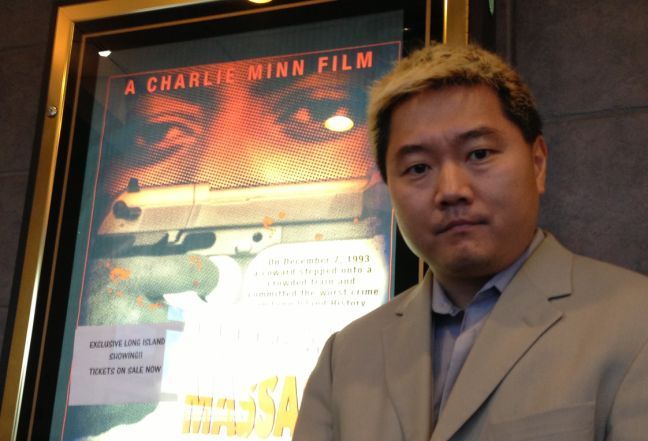To filmmaker Charlie Minn, the worst crime in New York’s history prior to the September 11 attacks happened 20 years ago this December, and it hit the North Shore of Long Island.
On Dec. 7, 1993, gunman Colin Ferguson opened fire on a Long Island Railroad car passing through the Merillon Avenue station in Garden City, killing six people and wounding 19 others, including Mi-Kyung Kim, a classmate of Minn’s at Herricks High School.
The attack is the subject of Minn’s latest documentary, “The Long Island Railroad Massacre: 20 Years Later,” which chronicles Ferguson’s trial and sentencing to 315 years and eight months to life, the ensuing public outpouring for gun legislation and the night’s impact on victims, survivors and their families.
“Victims never have closure, that’s a myth,” said Minn, a Manhasset Hills native who now lives in Manhattan. “They want justice. You can never bring anyone back, but if you can get justice, it certainly helps.”
The film will begin a weeklong run at Merrick Cinemas and in Times Square on Nov. 15 and play at the Cinema Arts Center in Huntington on Dec. 7 before being cut down for an hour-long true-crime special to air on the Investigation Discovery network.
Minn said he began contacting victims nearly a year ago, but his efforts were galvanized after the elementary school shooting in Newtown, Conn., and the nationwide gun-control debate that followed.
“I think the gun-control debate has failed,” Minn said. “More than 10,000 people were killed [in shootings] since Sandy Hook. That’s a Tuesday night at the Coliseum for the Islander game. Regardless of the politics, something has to change.”
Minn said Mineola resident Joyce Gorycki, whose husband James was killed in the attack, aided him in his search for victims.
“I did all the memorials [after the attack],” said Gorycki. “I had everyone’s contact information.”
After the trial, Gorycki said, she moved to Arizona for a fresh start but came back to New York after 10 months because “it just didn’t feel right.”
Gorycki said she has since become a gun-control advocate and worked toward stricter legislation at the state and federal level.
“It’s so hard to get the laws passed that you want to because the [National Rifle Association] is on us,” Gorycki said.
Minn said one of the first people to consent to interviews for “LIRR Massacre” was U.S. Rep. Carolyn McCarthy (D-Mineola), whose husband was among those killed in the shooting and whose son was seriously injured.
McCarthy was elected to Congress in 1996 on a gun-control platform and has pushed for stricter federal legislation since taking office.
Efforts to reach McCarthy for this story were unavailing.
“To me, she’s a hero,” Minn said. “For 17 years, she’s been fighting a losing battle to stop these attacks, which seem to be happening more and more. I mean, who knows when the next one is going to be?”
Minn held a private screening of the film in April at the Shelter Rock Public Library in Albertson for victims of the shooting and their families.
Minn said he wouldn’t have sought a wider release for “LIRR Massacre” without the blessing of the victims and their families– which he earned.
“That certainly meant a lot,” Minn said. “It was a big hurdle to clear.”



